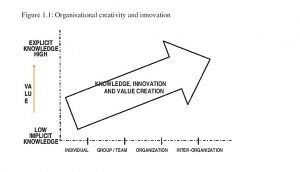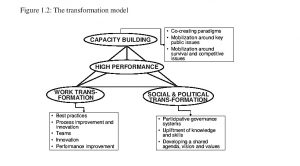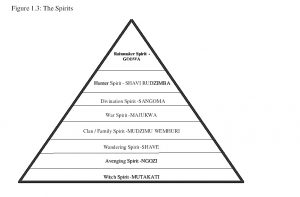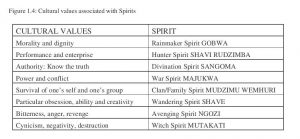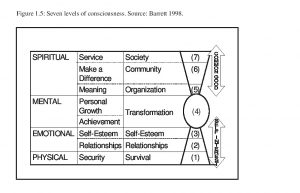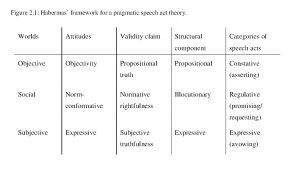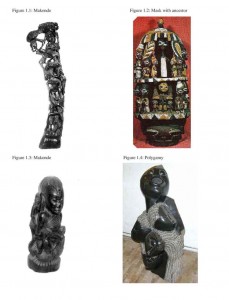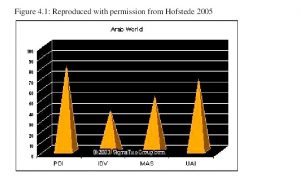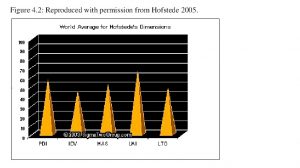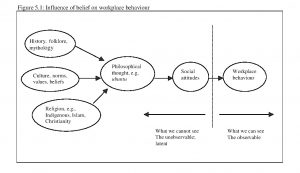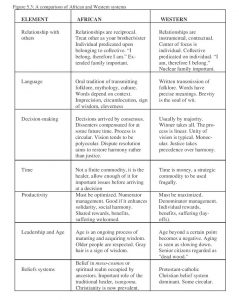Introduction. Prophecies and Protests ~ Signifiers Of Afrocentric Management Discourse
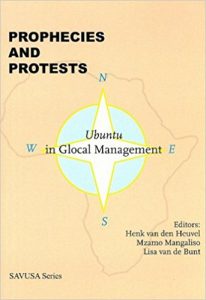 Since the early 1990s, dominant management discourse in South Africa has been contested by a locally emergent perspective that has come to be known as ‘African management’. It is doubtless still a rather marginal perspective, but one could argue it is a rather influential one. Over the years, African management has received quite some media attention.[i] Presently, a number of South African firms strongly sympathise with Afrocentric approaches, and actually make efforts to implement their principles. Eskom Holdings Limited is a case in point, which is contributing about 50 per cent of the total energy production in Africa with its approximately 32,000 employees, operating in 30 countries on the African continent. This ‘public enterprise’ that happens to be ‘Africa’s largest electricity utility’, has been undertaking bold initiatives to institutionalise its ‘African Business Leadership’ vision, illustrating a contemporary appropriation of ‘African management’ philosophy. Another example may be First National Bank (FNB).[ii] For several years, Mike Boon of Vulindlela Network has been actively involved in an organisational transformation initiative to change FNB’s organisational culture. Boon, who is the author of The African Way: The power of interactive leadership, is considered a renowned author on ‘African management’ issues (Boon 1996). Peet van der Walt, chief executive of FNB Delivery – also the man who approached Boon for this grand operation – stated that the initiative has met with overwhelming success (Sunday Times 28 April 2002). Eskom and FNB are two of the better-known illustrations, but several other organisations could be mentioned that are drawn towards to Afrocentric perspectives. Of course, we should not forget about the past experiences of Cashbuild, a wholesale company in building materials that was extensively described by Albert Koopman:
Since the early 1990s, dominant management discourse in South Africa has been contested by a locally emergent perspective that has come to be known as ‘African management’. It is doubtless still a rather marginal perspective, but one could argue it is a rather influential one. Over the years, African management has received quite some media attention.[i] Presently, a number of South African firms strongly sympathise with Afrocentric approaches, and actually make efforts to implement their principles. Eskom Holdings Limited is a case in point, which is contributing about 50 per cent of the total energy production in Africa with its approximately 32,000 employees, operating in 30 countries on the African continent. This ‘public enterprise’ that happens to be ‘Africa’s largest electricity utility’, has been undertaking bold initiatives to institutionalise its ‘African Business Leadership’ vision, illustrating a contemporary appropriation of ‘African management’ philosophy. Another example may be First National Bank (FNB).[ii] For several years, Mike Boon of Vulindlela Network has been actively involved in an organisational transformation initiative to change FNB’s organisational culture. Boon, who is the author of The African Way: The power of interactive leadership, is considered a renowned author on ‘African management’ issues (Boon 1996). Peet van der Walt, chief executive of FNB Delivery – also the man who approached Boon for this grand operation – stated that the initiative has met with overwhelming success (Sunday Times 28 April 2002). Eskom and FNB are two of the better-known illustrations, but several other organisations could be mentioned that are drawn towards to Afrocentric perspectives. Of course, we should not forget about the past experiences of Cashbuild, a wholesale company in building materials that was extensively described by Albert Koopman:
… we took up the challenge to change – really change – our business so that our people would see a different reality. And that would change their perception. […] We knew that our workforce was alienated from our system (they never understood it in the first place and never reaped the benefits from it either) and that we had to do a mighty good job to bring them into our business as ‘co-owners’. How else could they start believing in our business other than by reaping direct benefits from it? (Koopman; Nasser et al. 1987)
Overall, however, the dominant management and leadership style in South Africa is still mostly described as ‘western’. Usually, South African management is not only typified as ‘western’, but also as ‘North European’, ‘Eurocentric’, ‘British’, and ‘Anglo-Saxon’, or even as ‘American’.[iii] These terms are rarely well-defined, or differences clearly explained. There seems to be a consensus however, that British influence was amongst the strongest, and was assumed to have lasting effects. Textbooks and handbooks that are used in universities and business schools in South Africa are primarily written either by American or European authors, or else by local authors who write in a similar ‘mainstream’ tradition. An Afrocentric perspective could be a response to the felt need for ‘a contextualised approach’ to management and organisation in South Africa; at least that is how the issue was approached initially.
There is a body of literature on ‘African management’ (e.g. Boon 1996; Lessem and Nussbaum 1996; Mbigi 2006; 1997) and on management and organisation on the African continent (e.g. Blunt and Jones 1992; Jackson 2004; Kennedy 1988; Wohlgemuth, Carlsson et al. 1998). However, no book has yet brought together advocates of Afrocentric management approaches, practitioners, and academics, to analyse and contemplate on this fascinating and rapidly changing subject in a joint effort. Our focus is on the ‘African management’ discourse as a South African phenomenon, more precisely as an Africanist vision (or visions) on management and organisation.
Fostering dialogue
In June 2004, a two-day seminar on ‘Afrocentric management approaches in South Africa’ was held in Amsterdam, organised by the Faculty of Economics and Business Administration (FEWEB) and SAVUSA (South Africa – Vrije Universiteit – Strategic Alliances) of the Vrije Universiteit, with financial support from the Dutch Interchurch Organisation for Development Cooperation (ICCO). About thirty participants from Africa, North America and Europe met to discuss a number of papers that were presented, by some key initiators of the Afrocentric management debate in South Africa, such as Lovemore Mbigi, Albert Koopman and Ronnie Lessem. The main goal of the seminar was to start up a dialogue between practitioners and scholars to exchange views and ideas on the meaning of ‘African management’ discourse, and to discuss possible implications for business practice. During these two days, the proposal was made to produce a publication as a result of the seminar, with the purpose of engaging a larger audience in this experience and of furthering the dialogue.
This edited volume aims to inspire both readers interested in African studies and readers involved in issues around management and leadership in organisations. The book specifically deals with a subject area where African studies, and studies in the field of management and organisation, meet. Primarily it is a scholarly publication, which will mainly be read by academics. It presumes an affiliation with studies in the domain of management and organisation, and a basic knowledge of recent cultural and economic developments in southern Africa, especially South Africa. Which will mainly be read by academics. It presumes an affiliation with studies in the domain of management and organisation, and a basic knowledge of recent cultural and economic developments in southern Africa, especially South Africa.
The reader will not find case studies or detailed evaluations of applications of ‘African management’ principles in practice in this book. Contrary to this, the book focuses on ideas, on written text instead of on empirical research. It wants to bring together a collection of views on what ‘African management’ is about, what its principal claims are, and how these could be interpreted. Moreover, it aims to foster a dialogue between believers and non-believers, based in (South) Africa and elsewhere. Usually, these two groups hardly ever get together and seldom interact, but live and work in separate arenas. The believers in this case are ‘African management’ proponents, who could be considered as prophets or protesters. The non-believers are critical of this phenomenon, sometimes even skeptical, as they try to demonstrate, using rational arguments.
The subject of Afrocentric management approaches seems to render strong responses, from any audience of people involved in management, academia, or otherwise. These responses are usually either extremely positive or very negative. This seems to be the nature of the debate. Moderate opinions are rarely expressed. Whenever believers and non-believers do meet more often than not a clash ensues between proponents and critics, while outright skeptics seem too impatient to consider any interpretative readings of Afrocentric management discourse that seek to go beyond its most obvious features.
Why these strong responses? The question rises whether opposing value systems and worldviews are involved, or if another opinion of what constitutes (local) knowledge and ‘truth’ could be a major reason for such vibrant debate. Is there a conflict of interests? One wonders whether the issue of ‘cultural difference’, that appears so overwhelmingly difficult to bridge, lies at the base of this, in particular the binary position of ‘African’ versus ‘non-African’? If this is the main issue, the question is whether these differences are ‘for real’ or merely presented as such, while in fact signifying something else. If so, what could they be symbols of? Moreover, if cultural difference is principally treated in absolute terms, the question remains how to deal with these (real or imagined) differences in the daily practices of management and organisation.
Essentialism
Notions of ‘African culture’ and ‘traditional values’, such as ubuntu for instance, are paramount in the construction of ‘African management’ philosophy. Some observers are especially watchful for a possible manipulative use of such concepts, when they are for example used in a context of management and leadership. To some, reference to these notions may be enough to shy away from the debate. This book is an attempt to turn that tide. As a result, the editors hope to stimulate interdisciplinary assessments that seek to develop critical perspectives, in a considerate way.
The concept of ubuntu is subject to a lively academic debate. Critics deem it problematic to simply lift this ancient concept out of its original rural context and ruthlessly transplant it into a completely different, modern urban environment (Jackson 2004: 7; Van Binsbergen 2001). In that way, ubuntu becomes completely detached from its original web of social relations. Consequently, contextualized meanings of local (‘indigenous’) knowledge are disregarded. Some commentators even openly doubt whether there is any real substance to what remains of ‘indigenous culture’ in South Africa (Bernstein 2002). Furthermore, the complex ways in which notions of ubuntu have been transformed throughout the ages as a result of colonialism, apartheid and globalisation, tend to be overlooked.
Ubuntu philosophy … constitutes not a straight-forward emic rendering of a preexisting African philosophy available since times immemorial in the various languages belonging to the Bantu language family. Instead, ubuntu philosophy will be argued to amount to a remote etic reconstruction, in an alien globalised format, of a set of implied ideas that do inform aspects of village and kin relations in at least many contexts in contemporary Southern Africa; the historical depth of these ideas is difficult to gauge, and their format differs greatly from the academic codifications of ubuntu (Van Binsbergen 2001: 57).
The idea of ubuntu has been turned into a modern commodity, wrapped up in a global format, as Van Binsbergen argues. As such, it has acquired a meaning quite different from what it could once have meant in its original context. Nevertheless, this is generally how ubuntu is represented in ‘African management’ discourse in South Africa: as an illustration of an essentialist perspective on ‘African culture’, as something unchanged and unchangeable, a homogenising concept that supposedly ties all Africans together.
What are the implications of such a perspective? Does it come with a claim to ‘original alterity’, a state or quality of ‘being other’, ‘being different’? Does it imply an exceptional moral status? Claims to African tradition could be used to supply ‘signs and meanings of African authenticity’. From another point of view, traditional ‘authentic African elements’ might serve as ‘weapons for a radical criticism’ by means of strategic essentialism (Mudimbe 1988: 153).
Essentialism is a core issue in this book. Arguably, ‘African management’ philosophy is highly essentialist by nature. Does this mirror dominant ‘western’ (ethnocentric) essentialist discourses of ‘management’ and of ‘being African’? In reply, this book invites the exposure of non-essentialist perspectives. Taking into account, of course, that responses to an essentialist discourse could perhaps also be essentialist to some extent.
The idea of cultural determination is another feature of the ‘African management’ discourse that can be found in this book. In this perspective, culture is not so much seen as the knowledge that a person needs to be able to understand and ‘make sense’ of a situation, but rather as an independent variable. Cultural determination implies a causal relationship between ‘culture’ and ‘social action’. The chapters by Mbigi and Mangaliso are examples of deterministic thinking; both authors seek to promote ubuntu as a management concept. Perhaps, an essentialist and generalising approach is to some extent unavoidable in any management philosophy. Would a management ‘prophecy’ not loose much of its captivating power and attractiveness, if it would endlessy elaborate on the endless cultural complexities, tensions and paradoxes in society and managerial contexts? Is ‘African management’, as any fascinating or fashionable management vision, not particularly appealing to its potential users for its holistic and imaginative character that goes beyond conventional boundaries and horizons? Could we say that it is appropriate or inappropriate to speak of ubuntu and ‘African management’ philosophy in rather essentialist and deterministic terms? Only through a conversation, we might explore hidden meanings, deficiencies, and reasons why this issue has come about. We might also learn something about the ‘strategic essentialism’ that the philosopher Mudimbe referred to. The question why ubuntu has become such an appealing idea to many is a fascinating one, while ubuntu is ‘out of place’, yet seen as ‘an African thing’ that promises surprising points of view.
… ubuntu, when appealed to in the modern management of urban and national conflicts, can be effective, but not because it summarises the internalised cultural orientations of the Africans involved in such conflict – very far from it, for these Africans are largely globalised in their world-view and practices, and are no more governed by village rules and allegiances than people in similar urban and national arenas in other continents. Despite having rural and small-scale face-to-face relationships as its referent, ubuntu can be effective, in the first place because it is appreciated as an African thing, but in the second place and especially because, despite its globally-derived format, it introduces non-global, particularistic and intimate elements in the very heart of Southern African globalisation. Ubuntu can work precisely because it is novel, out of place there where it is most appealed to. It allows the conflict regulator to introduce an unexpected perspective to which (for historical, identity and strategic reasons) few parties could afford to say ‘no’ (Van Binsbergen 2001: 74).
From a dominant management perspective, it seems quite tempting to criticise ‘African management’ prophets. This makes one realise that culture should be treated as a power process, related to ideology and knowledge. Dominant discourses come with claims to ‘the truth’ and ‘normality’ that will be defended when contested by an alternative perspective.
It requires constant discoursal effort continually to reassert the status of a discourse as ‘true’, objective, neutral or normal and to displace other emergent discourses, labelling them as abnormal, disordering or political (Wright 1994: 25).
When representatives of dominant management discourses in South Africa actually begin to feel challenged by Afrocentric perspectives and become defensive of their dominant approaches, this could perhaps be an indication that they are starting to reflect on their own management practices, their ‘worldview’, and maybe even about changing political realities.
Prophets and protesters
Perhaps the title of this book, ‘Prophecies and Protests’, requires some explanation. ‘Prophecies’ refers to the Afrocentric management visions that are presented in the book. To some extent, they are characterised by rather sweeping claims, suggesting farreaching consequences. Somewhat provokingly, ‘African management’ advocates could be seen as prophets. Some may turn out to be true visionaries; others will perhaps be unmasked as ‘false prophets’ eventually.
Afrocentric management prophets criticise for instance South Africans who they say have lost their sense of cultural identity; ‘westerners’ would suffer from a similar symptom. The question is whether traditional African notions nowadays still belong to the cultural make-up of a person’s self-representation in South Africa. Do people deliberately hide such cultural features in formal organisational contexts, out of fear for being seen as inferior, old-fashioned, or backward? In the 1980s, black managers in South Africa were advised to ‘deculturalise’. They were told to ‘to “dump” their cultural heritage to succeed in white business’ (Reese 1981: 23). Will they now, 20 years later and after the radical change of rule in 1994, have to (re-)negotiate their (‘African’) cultural identity within their organisations (Luhabe 2002: 167)?
Alternatively, perhaps people choose to constantly adapt to differing situations, and accordingly use their identity strategically, in flexible ways, depending on how to achieve specific goals or obtain access to scarce resources. Likewise, managers – regardless of ethnic or cultural background – may continuously adapt their behaviour according to the situation and thus conform to traditional cultural values situationally (Human 1996: 177). There are so many questions relating to cultural identity issues in a (South) African context, and the prophets raising these questions, may indeed have a point in asking them.
Secondly, protesters refers to the kind of criticism articulated throughout Afrocentric management discourse that supposedly argues against conventional management practices in South Africa, for instance against over-bureaucratisation, uncongenial relationships or a lack of spirituality. There is a parallel with anti-globalist sentiments directed against individualisation, marginalisation and social exclusion, issues for which identity-based social movements in southern Africa may find some comfort in the ubuntu concept:
The radical project, under these circumstances, has to be one that finds relevant answers to the question how social movements that are based on challenging the individualising and barbarous logic of the global economic networks can transform them into one that has as its major term the survival and continued evolution of the human species as a biological and social category of free and autonomous beings, bound together by the profoundly humanistic ethos of ubuntu in the universe.(Alexander 2001: 138-9).
This is not to suggest that the ‘African management’ community in South Africa would in some way be affiliated with a larger anti-globalisation front, such as the Anti-Privatisation Forum, but similar sentiments and desires could be a factor in popularising ‘African management’ discourse. In fact, it is not being advocated as ‘anti-western’, ‘anti-globalisation’, or opposed to capitalist development at all. On the contrary, ‘African management’ prophets rather seem to flourish within a capitalist economy, as some well-to-do management consultants show us. They nonetheless represent a cultural protest group, in the sense of contesting mainstream opinions in management. Such claims often meet with scepticism, and even with hostility:
… discourse plays a role in various forms of resistance and counter-power, in protest songs, banners, ethnic media, dissident scholarly work, and so on. However, since minority groups and (other) anti-racists seldom have as much access to the dominant media or other forms of public discourse as the mainstream elites, their discourse is usually effectively marginalized, problematized or ridiculed. (Van Dijk 1997: 165)
African management advocates’ protests seem to opposed a ‘western’ hegemonic position, and (‘western’) claims of universalism in the domain of management and organisation. In South Africa, existing (‘Eurocentric’) organisational norms, management practices and leadership styles are largely taken for granted; they seem to be untouchable, something which ‘African management’ discourse seeks to question. The almost self-indulgent conceit with which global management is practised in an African environment is revolting to many ‘African management’ thinkers, and this causes them to raise fundamental questions. Their corporate crusade is not limited to South Africa. Afrocentric management discourse pretends to bring humanity back into the workplace, putting people at the centre of organisations, and to inspire employees and employers to re-create notions of Africanness.[iv] The latter will be discussed in more detail in the paragraph on identity and belonging.
Challenge and contestation form an indisputable element of ‘African management’ discourse. Although its advocates do certainly not constitute a grassroots protest group, they could still be conceived in terms of a community or movement. Those who strongly identify with the idea of ‘African management’ can tacitly become part of this community, suggesting a sense of belonging. Ever since the concept was established in South Africa, people started referring to it as ‘ubuntu movement’ (Jackson 2004: 250) or ‘African management movement’ (Thomas and Schonken 1998; Maier 2002).[v]
Glocalisation
This book’s subject – ubuntu in relation to management – can be seen as an illustration of the cultural dimension of globalisation, of what Roland Robertson called glocalisation – a contraction of the words ‘globalisation’ and ‘localisation’ –in the sense of new cultural products that are being created:
… clearly many have seriously underestimated the flow of ideas and practices from the so-called Third World to the seemingly dominant societies and regions of the world.
(Robertson 1995: 38-9).
Global cultural processes comprise creative local processes and the production of new culture in which ‘the local’ and notions of ‘home’ and ‘community’ are emphasised. What happens at the local level is itself constitutive of globalisation. Thus, globalisation is a two-way process of influencing (Hart 2002: 14). This does not mean, however, that globalisation would actually have caused ‘African management’ discourse to emerge in South Africa; still, it has come up against a background of globalisation and as part of larger global cultural processes. Likewise, in other parts of the world, especially in Asia, local management and leadership discourses have come forward, in which notions of traditional values and indigenous knowledge are also given emphasis (e.g. Hayashi 1988; Van Wolferen 1989; Redding 1993; Chung, Lee et al. 1997). The actual circumstances, the specific moment, and the ways in which ideas with regard to Afrocentric management philosophy have been externalised, articulated and disseminated, are specifically related to local South African political and cultural contexts during a time of transition from apartheid to majority rule.
Glocalisation, in the sense of a two-way process of cultural influencing, raises the prospect of ‘exporting’ ideas around ubuntu and management to places beyond (South) Africa. The global and the local are influencing each other, are intermingling, with the local eventually giving something back to the global. Thus, a form of glocal ubuntu could come into existence, as ‘African management’ prophets anticipate. The image that innovation always comes from ‘the West’ is being discursively reversed. ‘African management’ advocates radiate optimism. If one accepts the idea of Africa as the ‘cradle of humankind’, meaning that human civilisation started in Africa, this acknowledges Africa’s crucial role for humanity and worldwide civilisation.[vi] This is in defiance of more dominant views of Africa’s ‘primitiveness’ and dependency.[vii] In this reasoning, if humankind indeed emerged from Africa and man was able to develop tools to survive, to multiply and spread over the world, why would it not be possible to develop new perspectives on management and leadership here? In other words, Africa
could have ‘something special’ to offer to the world, especially in the realm of humanity and spirituality, an important message, a solution to certain difficulties that other societies (in ‘the west’) suffer from. An example is provided by the book Lekgotla. The art of leadership through dialogue by Willem de Liefde, a Dutch author who has worked for years as, amongst others, a managing director in Africa and who recognises the spirit of lekgotla, the traditional Batswana meeting point around a fireplace. Initially the book was published in Dutch to inform managers in Europe about the concept of ‘African tribal leadership’. A year later, it was translated into English and launched onto the South African market (De Liefde 2003).[viii] This is a quite extraordinary illustration of the popularity of the idea of glocal ubuntu.
Competitiveness
Being constitutive of globalisation itself, in a somewhat paradoxical way Afrocentric management discourse seeks to challenge ‘the global’ to the point that it imagines itself teaching the world about ubuntu. This could be realised by achieving what Ronnie Lessem has called the Southern African Businessphere in his ‘Four Worlds of Management’ model (Lessem and Nussbaum 1996; Lessem 1994). According to this model, ‘southern’ and ‘eastern’ orientations are less prominent in South African corporate cultures and business realities than ‘western’ and ‘northern’ orientations were.
… corporate culture in the north is characterised by rationalism, in the west by entrepreneurship and pragmatism, in the east by holism, and in the south by humanism (Lessem and Nussbaum 1996: 13).
According to Lessem, embracing all ‘four worlds of management’ – an integration of ‘western’, ‘northern’, ‘eastern’ and ‘southern’ perspectives – is something that not only the South African business community should do, but is a message to the whole world, since there are business lessons to learn from South Africa. Mbigi and Mangaliso support this idea, as they will explain, in chapter 1 and 5 respectively.
With South Africa’s official re-entry into the global economy after 1994, and the ensuing intensification of its global interactions, companies have been struggling with issues like the increased worldwide competition, corporate identity, diversity management and transformation. Under these circumstances, the South African private sector attempts to become globally competitive above all. ‘African management’ discourse, including the ‘four worlds of management’ model, claims to be able to provide the tools to achieve that goal. Strategic business considerations and ‘enlightened self-interest’ can be motives to become absorbed by an ‘African management’ approach. This relates to what Mbigi in his transformation workshops ironically categorises under ‘survival strategies for whites in South Africa’. Against the background of black economic empowerment initiatives and measures of the South African government in the area of affirmative action within the labour market, white managers may fear their own replacement or redundancy in due course for the sake of the upward mobility of black managers. Therefore, they will have to review their strategies and ‘adapt culturally’ in the context of the ‘New South Africa’. Identification with Afrocentric discourse may thus emerge as an option for economic survival. It would certainly be worthwhile to consider the motives of entrepreneurs and managers in South Africa for drawing on an ‘African management’ rhetoric that may not always be merely normative or altruistic. To enable the reader to position Afrocentric management discourse within South Africa, a brief description of the context in which it emerged, follows next.
A mood of change and a change of mood
The emergence of the discourse on ubuntu in relation to management has to be considered in the light of the transition and transformation in South Africa in the late 1980s and early 1990s (Van den Heuvel forthcoming). Against a background of political violence, strikes, and widespread feelings of insecurity in the years prior to 1994, (white) entrepreneurs and business people feared a nationalisation of the industry and the unknown consequences of black majority rule in terms of macro-economic policies. Simultaneously however, a sense of optimism and excitement arose among a small but significant group of business leaders, marketing and management ‘mavericks’. The positive imagery of a future multicultural democratic South Africa appealed to them and unleashed hitherto unknown energies. In this condition, ubuntu – presented as an ‘indigenous African style of participatory management’ – offered a source of inspiration, also to white South African entrepreneurs moving away from
paternalistic and discriminatory approaches to management:
As this country rediscovers its pride in itself, we are discovering the magic of the Afrocentric, rather than the Eurocentric, path to the high ground of shared Values (Lascaris and Lipkin 1993: 45).
Afrocentric values became associated with something mysterious and fabulous. All of a sudden, the ‘African culture’ that used to be ignored in conventional management literature in South Africa and that was deemed inferior and used in a divide-and-rule strategy in the Bantustan policy under apartheid, acquired a renewed recognition. Peter Vundla, Chief Executive Officer of Herdbuoys in the 1990s and one of the very few ‘early’ black managers in South Africa at the time, commented:
We need to redefine management in this country by appreciating the African-ness of our people (Lascaris and Lipkin 1993: 46).
A remarkable transition from apartheid to democracy brought about a search for ‘a (South) African way’ of managing organisations, inspired by ‘African culture’. As Nick Binedell, who became director of Wits Business School in Johannesburg in 1992, put it:
… what was very clear at the time was … that the dynamics of South Africa and African culture were not really addressed in organisations.[ix]
In the early 1990s, Peter Christie and Nick Binedell were actively involved in facilitating the South African Management Project (SAMP) that ran at Wits Business School. SAMP constituted a vital platform for the expression of views and debates on ubuntu and Afrocentric management. With several publications coming out of that initiative, ‘African management’ was definitely launched as a ‘new’ management concept in South Africa. Peter Christie wrote the following in a preface to the book African management. Philosophies, Concepts and Applications:
Management of African organisations has traditionally been largely neglected by the mainstream business literature. (Christie, Lessem et al. 1994: s.n.) From the outset, it was not immediately clear to all that ‘African management’ was notsymply synonymous to ‘managing organisations in Africa’. The former was particularly an identity-related perspective, as the adjective ‘African’ suggests. It entailed a vision of what ‘Africanness’ would mean in the context of management and organisation in a post-apartheid era, with highly normative ideas, assuming that (black) African people all shared specific cultural characteristics.
The ubuntu concept
Further to its normative character, Afrocentric management discourse seems to be characterised by a search for cultural purity and authenticity. This is illustrated by the use of ubuntu, the key concept in this respect. Ubuntu is a term derived from the Nguni language group in southern Africa, expressing a strong sense of community, collective morality and unconditional solidarity. The equivalent in Sotho languages would be botho, and umunhu in Shona.[x] It supposedly stands for the essence of being human, shared humanity or humaneness, and for the essence of Africanness. The frequently cited phrases ‘A person is a person through others’, and ‘I am because we are’, a reading in English of the African aphorism in Zulu (and Xhosa) umuntu ngumuntu ngabantu and in Sotho motho ke motho ka motho yo mongwe or motho ke motho ka ka batho, are used to illustrate the meanings ascribed to ubuntu. Supposedly, it articulates ‘a basic respect and compassion for others’:
It is both a factual description and a rule of conduct or social ethic. It not only describes human being as ‘being-with-others’ but also prescribes how we should relate to others, i.e. what ‘being-with-others’ should be all about (Louw 2002: 5).
The type of noble virtues associated with ubuntu concern cooperation, reciprocity, hospitality, kindliness, mutual trust, respect and equality, but simultaneously it seems to be a rather open-ended construct that may serve as a container for a variety of meanings.
Ubuntu is an ideal concept, often flawed in interpretation in practice. Because the word is being thrown around in popular media, its meaning has become ambiguous and unclear. (Venter 2004: 149)
An Afrocentric cognitive framework and key concepts such as ubuntu may remain rather vague, specifically what they supposedly mean in a modern management context. This is an advantage at the same time, for it creates space to discursively develop such concepts within specific organisational environments.
The origins of ubuntu take us back to rural village life in pre-colonial Africa, where it supposedly was a key value in traditional social organisation. In current Afrocentric discourse the notion of ubuntu is revitalised and re-invented. Amongst its several domains of application, it is also given a central place in conceptualisations of leadership and management in modern contexts, assumingly still resembling ‘authentic’ African traditions and values. This assumption can be problematised in at least two ways. Firstly, the idea that African values and traditions can be taken as components of a homogeneous entity, with only some minor regional variations, is problematic. This assumption largely ignores the wide diversity of civilisations and differing cultural orientations throughout Africa that have developed in the course of times. Secondly, the notion of something ‘authentically African’ is also questionable. A plethora of cultural interactions and diffusion that went on for many centuries both within Africa, and with (past ancient) civilisations outside the continent, would be entirely ignored. Such processes have intensified in the era of globalisation. Processes of cultural diffusion in Africa have probably been taking place since the very beginnings of humanity. At best, indigeneity could be considered a temporary condition. ‘From prehistoric times down to today’, wrote W.E.B. du Bois already in the early twentieth century, ‘Africa is … primarily the land of the mulatto’, which is quite a remarkable observation for a man of his time (Du Bois 2002 [1915]: 36).
Identity and belonging
The South African philosopher Mogobe Ramose, who has greatly inspired Heinz Kimmerle’s thinking about ubuntu, has profoundly studied, and reflected on, this concept. Ramose is convinced that the notion of ubuntu can be of great value to contemporary South African society, in spite of (or perhaps thanks to) its ambiguity and flexibility (Ramose 1999). Its value concerns for instance its reconciliatory potential, and the idea that it could provide a sense of identity, self-esteem, and belonging. Its popularity should be considered in the context of a society where ‘negative images of self’ subsist amongst black intellectuals (Mamdani 1999: 127). In this view, the notion of ubuntu becomes an ideological tool, and is instrumental as an identity-marker. Again, this can also be interpreted in a different way, raising critical questions about the prospects of realising a society based on ubuntu principles, such as for example Jan Boessenkool and Henk J. van Rinsum will do in chapter 7 of this volume.
Attributes ascribed to ubuntu are analogous to the rhetoric around African Renaissance that is said to have the power to provide the ‘seeds of hope’ that the continent is so desperately seeking for: the desire for ‘a new beginning’, for which in a post-cold war context the timing would be exactly right (Okumu 2002: 145-6). It underlines ‘an increasingly powerful appeal strongly articulated by intellectuals, for a new future for Africa’, opening up exciting possibilities to change the lives of people across the continent (Vale & Maseko 2002: 129-30). Such claims are also linked to the project to ‘decolonise the mind’, shaking off feelings of humiliation and inferiority. The historical dimension, the recognition of a long history of domination and ‘unfree’ labour in South Africa, is an essential aspect in the contextualisation of this emergent local approach. Precisely this aspect, the impact of human suffering and experiences of humiliation in the South African workplace of the past – for both employees and employers – often seems to be overlooked in evaluations of ‘African management’ discourse in contemporary business practice.
It should be acknowledged however, that there also non-essentialist ways to approach identity formation in an African setting, for instance in terms of – negotiable, multiple, complex and dynamic – identification: ‘… each act, each signification, each decision risks opening new meanings, vistas and possibilities’ (Nyamnjoh 2001: 30). Francis Nyamnjoh believes that most people in Africa refuse to think in dichotomies and ‘to be fenced in by particular identity markers’. ‘Being African is not a birthmark’, he says, seeing African identity as a process. Besides the potential value of the ubuntu concept, its ideological use and its function as identity-marker, some other critical notions will be raised in the following section.
Hard questions
Visions of ‘African management’, with their optimistic and hence to some extent onesided illustrations, tend to ignore potential negative consequences at the implementation side. For instance, in ‘African management’ discourse there is generally an emphasis on social obligations towards the community instead of ‘individual rights’. This presupposes an unconditional compliance to the social group. How does this relate to the free will of the individual, and how could this work out in organisational practice?
In relation to this, Christoph Marx published a challenging article, in which he compared Africanist versions of ubu and ubuntu with culturalist representations of Afrikaner nationalism. Marx emphasises that with the revitalisation of ubuntu – also embedded in African Renaissance ideology – a ‘romanticised and largely ahistorical image of Africa’ is invoked. All this is presented in explicitly conservative terms, denying the cultural diversity of Africans (Marx 2002: 65). Consequently, the Africanist culturalist nationalist idea, which also characterises ‘African management’,
… centred on the notion of ‘Ubuntu’, is preparing the ground in which the ‘flowers of evil’ might once blossom again in South Africa (Marx 2002: 50).
In extreme phraseology, Marx sends out warnings for ‘fascist ideas of “corporation management”‘ justified by Afrocentric management discourse (Marx 2002: 65). In addition, the discursive use of ubuntu in post-apartheid organisational contexts could lead to the covering-up of conflicts, by displaying subtle mechanisms of social inclusion and exclusion, and as a consequence of strong appeals to Afrocentric notions of egalitarism, friendliness and togetherness. Van Binsbergen has also pointed at ‘the potential dangers of ubuntu as mystifying real conflict, perpetuating resentment’ that,
in his view, was demonstrated for instance in the dealings of the Truth and Reconciliation Commission (Van Binsbergen 2001: 57). Supporters of critical management studies tend to highlight the ‘hidden agendas’ behind humanistic management approaches, such as alternative means of control and ‘soft domination’ in the workplace under the disguise of ‘communalist interests’ (Clegg, Kornberger et al. 2005: 168-9).
There are probably no unambiguous answers to the ‘hard questions’ and to critical notions. It will have to show in actual practice. Since the implementation of management concepts always depends on particular institutional contexts, prevailing power configurations and interests at stake, it is likely that practical experiences with Afrocentric management principles will inherently be highly differential.
Contributions
After these introductory remarks, I will briefly present the respective chapters in this volume. As announced earlier, the reader will come across a wide spectrum of views. Lovemore Mbigi is a management consultant, motivational speaker and workshop facilitator, who strongly identifies with an Afrocentric worldview. He is proud to be called a tribesman, and he has made it his mission in life to disseminate his ideas on ‘African management’ philosophy. To some extent, Mbigi is also associated with the academic community, but altogether he does not sit too easily into this category. He is habitually referred to as ‘Professor’, regularly involved in lecturing assignments and also a mentor and supervisor to numerous southern African students. Nevertheless, and he is the first one to point this out, he is not ‘a typical professor’. Mbigi claims to have branded the concept of ubuntu in relation to management. His contribution should in the first place not be seen as an academic assessment of the concept, but rather as an attempt to promote ‘African management’ as a management philosophy. Therefore, it is clearly a managerial text, revealing his personal vision.
In the first chapter Mbigi explains, sometimes somewhat provocatively and prescriptively, what ubuntu means in an Africanist interpretation, and how it could contribute to revitalising organisations in South Africa, and help business leaders and employees to rediscover and harness their African cultural heritage. Mbigi has been making his proclamations in an animated prophesying campaign for more than fifteen years now, if not more. He is, as it were, almost a personification of ubuntu in relation to management in southern Africa, as he was already on the scene when it all came about in the early 1990s. What is more, he is still actively committed to keep the discourse alive. His ‘statements of belief and aspiration’ in the spirit of an Afrocentric management approach should not be confused with ‘descriptions of reality’, as Van Rinsum and Boesenkool point out in chapter 7.
In chapter 2, Luchien Karsten complements Mbigi’s views with a closer look on management and leadership concepts used in Afrocentric discourse, highlighting the importance of language use in the domain of management and organisation, relating to specific worldviews. Karsten examines the nature of management concepts, management fashion, and knowledge transfer. Thus, he assesses what ubuntu has in common with (other) management concepts. He argues that this concept represents an African worldview that is not captured in conventional American or global management speak that is supposed to be ‘universal’. Even though one could classify ‘African management’ and ubuntu in terms of management fads, Karsten believes it has very valuable implications in the context of management in an African setting.
In chapter 3, through an interlocking philosophical excursion, Heinz Kimmerle discusses in further detail the idea of ubuntu and in particular Ramose´s interpretations of it. He provides – in a somewhat generalising manner – an overview of a variety of meanings pertaining to (equivalents of) ubuntu and communalism in a wider African spectrum, to grasp a number of different connotations and nuances in the use of these concepts in the domain of African philosophy and art.
Taking this publication as a vantage point for further enriching Afrocentric management thought, David Weir reflects on Arab and Islamic features of management and organisation in chapter 4. He suggests that Arab and Islamic conceptualisations could substantially enrich Afrocentric perspectives, since in practice – as his contribution surprisingly shows – there are some striking similarities between Islamic and Afrocentric perspectives on management. Weir’s publication is also a clear illustration of Africa’s cultural diversity, also in the domain of management and organisation, thus simultaneously countering homogenising Afrocentric conceptualisations.
In addition, Mzamo Mangaliso and Nomazengele Mangaliso explain their views on the potential value of ubuntu and management in chapter 5. They present and promote this approach, in a professional, academic style. Yet, it clearly shows that they reside with the prophets, also promoting the glocal dimension of the discourse. Mzamo and Nomazengele Mangaliso were born and raised in South Africa, ut they have been living and working in the United States for a very long time, integrating their professional experiences from that continent into their own management views. Thus, they try to inspire also a ‘non-African’ audience with South Africa’s management lessons. Their contribution is probably particularly appealing to practitioners.
Perhaps, the essentialist features of ‘African management’ discourse that are so often criticised in academia both in Europe and in Africa itself, may turn out to be instrumental in provoking challenging conversations that would otherwise not take place. Such conversations possibly help to identify and break certain taboos in organisational and management discourse – for example with regard to ‘ethnicity’ or ‘traditional religious values’, and to show how these notions become manifest – or not – in modern organisational contexts, confronting ‘modernity’ with ‘tradition’ inside South Africa.
In chapter 6, Peter Franks develops this argument in his own contemplative way, polarising notions of ‘modernity’ and ‘tradition’ to make his point clearer to us. Tapping from many years of personal managerial experience, Franks’ contribution represents an interpretative point of view, with amazing insights from organisational realities in a South African rural context.
In chapter 7, Henk van Rinsum and Jan Boessenkool take an outspoken critical stance in the debate, highlighting the political dimension. They point at the metaphoric power of Afrocentricity, arguing that the emphasis on Afrocentric management approaches implies a dichotomy with Eurocentric management, which rather symbolises an urge of Africans to liberate themselves from colonialism and apartheid. Van Rinsum and Boessenkool draw attention to the tensions and paradoxes around this debate. In particular, they wonder whether ‘fancy’ ubuntu talk by prosperous businesspeople and smart consultants is not merely a strategy to conceal the mounting poverty gap in South Africa.
Finally, co-editors Mzamo Mangaliso and Lisa van de Bunt review all contributions, adding their insightful evaluative comments.
A methodology of listening
Dialogue is not just about talk. It is also about listening. The ‘methodology of listening’, which Heinz Kimmerle discusses in chapter 4, is also suggested here: listen patiently to what the other person has to say. This requires openness and dedication, but it also takes courage to confront one another with opposing viewpoints. To the extent that identities are involved in this dialogue, these are not just about assumed differences like ‘African’ versus ‘European’, or ‘Afrocentric’ versus ‘Eurocentric’ points of view. For instance, professional identities play an important role in this context. Obviously, a management consultant probably has other ways of interpreting social realities and presenting a management vision than a scholar or a business leader will have. A further differentiation exists among academics, largely depending on their specific disciplinary embedding or epistemological viewpoint. Naturally, a philosopher tends to highlight other aspects than a scholar of management studies or an organisational anthropologist. The reader will therefore hit upon highly diverse views on Afrocentric management perspectives. This is exactly what makes the book so unique and absorbing, but of course, it is quite impossible to give a comprehensive and ‘definite’ perspective. The dialogue moves on.
First, we should read and listen carefully to what ardent representatives of Afrocentric management thinking are telling us, and see what terminology and images they call upon to put their message across. Using terms such as Prophecies and Protests, believers and non-believers in this context reveals that apparently there are religious aspects to the debate. Perhaps the time has come to start listening to what Africans actually have to say about African ideas on spirituality and religion, and to take things literally as they are told, instead of immediately forming incomplete or badly informed opinions.
We must move away from a common Western tendency to define religion almost exclusively in terms of a search for meaning in life (Ellis and Ter Haar 2004: 3).
This volume is considerate to the potential value that Africa-oriented or Africa-inspired perspectives could add to management and organisational thinking, but without turning a blind eye to critical notes. Admittedly, not all issues that could be raised in an interrogation of ‘African management’ discourse are covered here. The editors acknowledge that there are several omissions. Readers may experience the lack of assessments of practical ‘African management’ experiences as a lacuna. For instance, how do people at the receiving end experience ubuntu management? And how do trade unions in South Africa perceive Afrocentric management approaches? Additionally, one may observe that the gender issue has not at all been addressed. Both ‘African management’ prophets and scholars – considerate and/or critical – have neglected this issue. How is the role of women conceived in ‘African management’ philosophy? Are specific gender roles defined? If the gender issue would turn out to be entirely ignored, what implications could this have on the position of women in organisational contexts? Therefore, we would like to invite readers to provide feedback and suggest additional points for debate in relation to Afrocentric management approaches. In any case, in this publication the non-believers have made efforts to focus on the believers’ points of view, allowing Africans the possibility to express matters in the terms they feel are appropriate. Vice versa, the prophets encounter other perspectives and opposing views. The outcome of the process is unknown as of yet, but the editors believe in dialogue as a virtue in itself.
NOTES
i. For example newspaper articles, book reviews and magazine features published in: Namibia Economist, 17 October 2003; Business Times, 12 October 2003; Financial Mail, 25 July 2003; Beeld, 23 July 2003; Die Burger, 16 October 2003; People Dynamics, March 2003, November/December 2002, February 1998, January 1993, October 1992; Patriot, 19 August 1999; The Star, 20 April 1997; Beeld, 7 October 1996; Sunday Times, 24 September 1995; Financies & Tegniek, June/July 1995; The Economist, 18 March 1995; The Natal Witness, 27 July 1994; The Daily News, 11 November 1991; Business Day, 31 October 1991.
ii. A qualitative case study research on employees’ perceptions of ‘African Leadership’ in FNB was facilitated by Wits Business School in Johannesburg and carried out in 2005-2006 by Elske van der Pol, MA student of the Vrije Universiteit Amsterdam.
iii. In a range of interviews with South African managers as part of a field research on ‘African management’ discourse, carried out between June 2003 and June 2004, these terms were mostly used to describe in general organisational culture and management and leadership styles in South Africa (Van den Heuvel forthcoming).
iv. For an in-depth discussion of identity formation in an African context, in relation to management and leadership, see Van den Heuvel (forthcoming).
v. Thomas and Schonken use this term in a somewhat disdainful manner.
vi. A central assumption in Afrocentrism is the image of Africa as the ‘cradle of humankind’, alluding to Africa’s assumed uniqueness and ancient character. Reference is made to scientific – or semi-scientific or pseudo-scientific – accounts that would affirm this claim, such as the book Out of Africa’s Eden. The peopling of the world (Oppenheimer 2003). Oppenheimer asserts that ‘a group living in central Africa 150,000 years ago are the ancestors of everyone living today’ and that ‘everybody who is not African can be connected by mitochondrial DNA to a single woman who apparently left Africa with a band of humans 80,000 years ago’ (Cape Argus 2003).
vii. For a discussion on imagery of Africa and notions of Africa’s primitiveness, see for instance Ashforth 1990; Blok 1997; Corbey 1989; Davidson 1994; Fabian 2000; Jahoda 1999; Mudimbe 1988; Rigby 1996; and Wylie 2000.
viii. For a review of this book see Van den Heuvel and Wels 2004.
ix. Interview with Professor Nick Binedell, Gordon Institute of Business Science, Illovo, 6 August 2003.
x. In Shona munhu means ‘person’ and umunhu means ‘human nature’ (Hannan 1984: 390).
References
Alexander, N. (2001) The politics of identity in post-apartheid South Africa, in S. Badat, N. Cloete, and J. Muller (eds) Challenges of globalisation: South African debates with Manuel Castells, Cape Town: Maskew Miller Longman & the Centre for Higher Education Transformation, pp. 126-43.
Ashforth, A. (1990) The politics of official discourse in twentieth-century South Africa, Oxford, New York: Oxford University Press / Clarendon Press.
Bernstein, A. (2002) Globalization, culture and development. Can South Africa be more than an offshoot of the West?, in P.L. Berger and S.P. Huntington (eds) Many globalizations. Cultural diversity in the contemporary world, Oxford: Oxford University Press, pp. 185-249.
Blok, A. (1977) Antropologische perspectieven, Muiderberg: Dick Coutinho.
Blunt, P. and Jones, M.L. (1992) Managing organisations in Africa, Berlin, New York: De Gruyter.
Boon, M. (1996) The African way. The power of interactive leadership, Sandton: Zebra Press.
Cape Argus (2003) Do we all originate from one African mother?, 7 November.
Christie, P., Lessem, R. et al. (eds) (1994) African management. Philosophies, concepts and applications, Randburg: Knowledge Resources.
Chung, K.H., Lee, H.C. et al. (1997) Korean management: Global strategy and cultural transformation, Berlin: De Gruyter.
Clegg, S., Kornberger, M. et al. (eds) (2005) Managing and organisations. An introduction to theory and practice, London: Thousand Oaks, New Delhi: Sage Publications.
Corbey, R. (1989) Wildheid en beschaving. De Europese verbeelding van Afrika, Baarn: Ambo.
Davidson, B. (1994) The search for Africa. A history in the making, London: James Currey.
De Liefde, W.H.J. (2003) Lekgotla. The art of leadership through dialogue, Houghton, Johannesburg: Jacana Media.
Du Bois, W.E.B. (2002) [1915] The Negro (with an introduction by Kenneth W. Goings), Amherst, New York: Humanity Books.
Ellis, S. and Ter Haar, G. (2004) Worlds of power. Religious thought and political practice in Africa, Johannesburg: Wits University Press.
Fabian, J. (2000) Out of our minds. Reason and madness in the exploration of central Africa, Berkely, London: University of California Press.
Hannan, M. (1984) Standard Shona dictionary, Harare: College Press Publishers. Hart, G. (2002) Disabling globalisation. Places of power in post-apartheid South Africa, Pietermaritzburg: University of Natal Press.
Hayashi, S. (1988) Culture and management in Japan, Tokyo: Tokyo University Press.
Human, L. (1996) Future competencies for managing diversity: What South African managers need, in M.E. Steyn and K.B. Motshabi (eds) Cultural synergy in South Africa. Weaving strands of Africa and Europe, Randburg: Knowledge Resources, pp. 171-83.
Jackson, T. (2004) Management and change in Africa. A cross-cultural perspective, London, New York: Routledge.
Jahoda, G. (1999) Images of savages. Ancient roots of modern prejudice in Western culture, London, New York: Routledge.
Kennedy, P. (1988) African capitalism. The struggle for ascendency, Cambridge etc.: Cambridge University Press.
Koopman, A.D., Nasser, M.E. et al. (eds) (1987) The corporate crusaders, Johannesburg: Lexicon Publishers.
Lascaris, R. and Lipkin, M. (1993) Revelling in the wild: business lessons out of Africa, Cape Town: Human and Rousseau.
Lessem, R. (1994) Four worlds – The southern African businessphere, in P. Christie, R. Lessem and L. Mbigi (eds) African management. philosophies, concepts and applications, Randburg: Knowledge Resources, pp. 17-40.
Lessem, R. and Nussbaum, B. (eds) (1996) Sawubona Africa. Embracing four worlds in South African management, Sandton: Zebra Press.
Louw, D.J. (2002) Ubuntu and the challenges of multiculturalism in post-apartheid South Africa, Utrecht: Expertisecentrum Zuidelijk Afrika (EZA)/Centre for Southern Africa, University of Utrecht.
Luhabe, W. (2002) Defining moments. Experiences of black executives in South Africa’s workplace, Pietermaritzburg: University of Natal Press.
Maier, C. (2002) Leading diversity – a conceptual framework. St. Gallen: University of St. Gallen.
Mamdani, M. (1999) ‘There Can Be No African Renaissance without an Africa-focussed Intelligentsia’ In: Makgoba, M.W. (ed.) African Renaissance. The new struggle. Sandton, Cape Town: Mafube Publishing Limited & Tafelberg Publishers Limited, pp. 125-34.
Marx, C. (2002) Ubu and Ubuntu: On the dialectics of apartheid and nation building, Politikon, 29(1): 49-69.
Mbigi, L. (1997) Ubuntu. The African dream in management, Randburg: Knowledge Resources.
Mbigi, L. (2006) The spirit of African leadership, Randburg: Knowledge Resources.
Mudimbe, V.Y. (1988) The invention of Africa. Gnosis, philosophy, and the order of knowledge, Bloomington: Indiana University Press.
Nyamnjoh, F.B. (2001) Concluding reflections on beyond identities: Rethinking power in Africa, in S. Bachir Diagne, A. Mama, H. Melber and F.B. Nyamnjoh (eds) Identity and beyond: Rethinking Africanity, Uppsala: The Nordic Africa Institute, pp. 25-33.
Okumu, W.A.J. (2002) The African Renaissance. History, significance and strategy, Asmara, Eritrea: Africa World Press, Inc.
Ramose, M.B. (1999) African philosophy through ubuntu, Harare: Mond Books.
Redding, S.G. (1993) The spirit of Chinese capitalism, New York: Walter de Gruyter.
Reese, K. (1981) Black managers in white businesses – why are there so few of them?, Business South Africa: 22-4.
Rigby, P. (1996) African images. Racism and the end of anthropology, Oxford, Washington D.C.: Berg.
Robertson, R. (1995) Glocalization: Time-space and homogeneity-heterogeneity, in M. Featherstone, S. Lash and R. Robertson (eds) Global modernities, London, Thousand Oaks, New Delhi: Sage publications, pp. 25-44.
Thomas, A. and Schonken, J.S. (1998) Culture-specific management and the African management movement – a critical review of the literature, South African Journal of Business Management, 29(2): 53-66.
Vale, P. and Maseko, S. (2002) Thabo Mbeki, South Africa and the idea of an African Renaissance, in S. Jacobs and R. Calland (eds) Thabo Mbeki’s world. The politcis and ideology of the South African president, Pietermaritzburg/London & New York: University of Natal Press & Zed Books Ltd, pp. 121-42.
Van Binsbergen, W. (2001) Ubuntu and the globalisation of Southern African thought and society, Quest – African Journal of Philosophy, special issue on African Renaissance and Ubuntu philosophy, XV(1-2): 53-89.
Van den Heuvel, H. (forthcoming) Between optimism and opportunism: Deconstructing ‘African management’ discourse in South Africa, Amsterdam: Vrije Universiteit (PhD dissertation, Department of Culture, Organisation and Management).
Van den Heuvel, H. and Wels, H. (2004) Lekgotla. The art of leadership through dialogue – Willem H.J. de Liefde, book review Journal of Public Administration, 39(1): 247-51.
Van Dijk, T.A. (ed.) (1997) Discourse as social interaction, London, Thousand Oaks, New Delhi: Sage Publications.
Van Wolferen, K.G. (1989) The enigma of Japanese power, London: MacMillan.
Venter, E. (2004) The notion of ubuntu and communalism in African educational discourse, Studies in Philosophy and Education, 23: 149-60.
Wohlgemuth, L., Carlsson, J. et al. (eds.) (1998) Institution building and leadership in Africa, Uppsala: Nordiska Afrikainstitutet.
Wright, S. (ed.) (1994) Anthropology of organisations, London: Routledge.
Wylie, D. (2000) Savage delight. White myths of Shaka, Pietermaritzburg: University of Natal Press.
